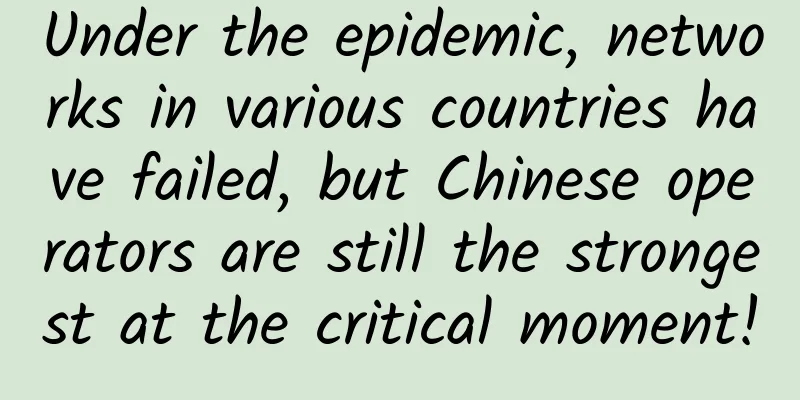Under the epidemic, networks in various countries have failed, but Chinese operators are still the strongest at the critical moment!

|
Under the epidemic, what is tested is not only human humanity but also network capabilities. Italy, internet speed plummets! On March 8, Italy announced the quarantine of Lombardy and some other northern regions. On March 9, Italy announced that the red quarantine zone in the Lombardy region would be expanded to the entire country. Then, the national Internet speed dropped... Data from third-party testing company Ookla Speedtest shows that since Italy's "lockdown", the average mobile network and home broadband speeds in Lombardy and Italy as a whole have both declined significantly. According to Italian media reports, due to the quarantine and blockade measures taken during the epidemic, people are working, studying and surfing the Internet at home, and network traffic has increased exponentially, resulting in a decrease in network speed almost everywhere. Italy's network infrastructure is facing an unprecedented test. Michele Gamberini, Chief Technology and Information Officer of Telecom Italia, said that our network traffic has increased significantly, especially home broadband networks, which have increased by 100% compared to before the epidemic. Spain, please use the Internet during off-peak hours! Spanish operators Telefonica, Orange, Vodafone, Masmovil and Euskaltel reportedly said that due to the impact of the epidemic, IP network traffic increased by nearly 40%, voice and data traffic increased by about 50% and 25% respectively, and traffic on instant messaging platforms such as WhatsApp increased fivefold. The network can’t take it anymore! Spanish operators are calling on users to:
Britain failed at the critical moment! On March 17, the mobile networks of British operators O2, EE, Vodafone and Three failed at a critical moment during the epidemic. An O2 user broke down:
After the failure, O2 said:
Three later confirmed that around 3% of its customers were experiencing issues with voice calls, while Vodafone said around 9% of its customers were experiencing issues with 3G calls. Some British media stated that millions of British people chose to work from home during the epidemic, which caused temporary congestion in the O2 network. Some operators said that our network is running well, but due to O2's network problems, O2 users cannot call our users. EE’s official website stated that the network failure was due to "problems with another operator’s network" and that the failure had nothing to do with the increase in the number of people working from home and surfing the Internet during the epidemic. It seems that everyone is trying to pass the buck. In response, O2 denied the above claims and said that at a time when the country needs connectivity the most, it is most important that we work together rather than pointing fingers before the cause of the outage has been determined. America, expand quickly! It is expected that due to the epidemic, more and more Americans will choose to work from home, which will lead to a surge in network capacity. At the same time, in the vast rural areas of the United States, about 20 million households do not have access to broadband. what to do? Hurry up and expand! How to expand? The 600MHz frequency band is low, the signal coverage distance is long, and the wall penetration ability is strong, which is very suitable for network coverage in suburban and rural areas. The US operator T-Mobile has used 600MHz to build a 4G network, and plans to use 600MHz to build a 5G network, taking advantage of the wide coverage of low-frequency power to quickly build a nationwide 5G network. But the problem is that the bandwidth of the 600MHz low-frequency band is small and the Internet speed is slow. How to solve the problem of so many people surfing the Internet at home? In many places in the United States, the bandwidth of T-Mobile's 600MHz frequency band is only 10MHz (10M each for upstream and downstream), of which 5MHz is allocated to the 4G network and 5MHz is allocated to the 5G network. As we all know, the network is like a road. The larger the bandwidth, the wider the road, the greater the traffic volume, and the faster the network speed. Usually, the single-carrier bandwidth of 4G LTE is 20MHz, while the single-carrier bandwidth of 5G network is 100MHz, so the network speed of 5G is several times that of 4G. T-Mobile's 600MHz frequency band only has 10MHz bandwidth. How can it ensure that so many people can work, study and surf the Internet remotely at home? T-Mobile came up with a unique solution - borrowing spectrum. T-Mobile’s official website announced that in order to increase network capacity, it will borrow 600 MHz spectrum from Dish, Bluewater, Channel 51, Comcast and other companies for 60 days. By borrowing spectrum, T-Mobile's 600MHz spectrum bandwidth can reach 35MHz (35M each for upstream and downstream), thereby increasing network capacity by 3-4 times. ... It seems that the networks of many countries have failed to stand the test of the epidemic. In contrast, the networks of my country's three major operators have ensured that hundreds of millions of users can work, study and entertain themselves from home during the epidemic. They have remained extremely strong and no one has failed. Moreover, after the outbreak, the three major operators immediately launched a 24-hour communication guarantee, focusing on ensuring smooth communication in hospitals, disease control centers and other places, and organized commandos to rush to the Huoshenshan and Leishenshan front lines, and quickly built a 4G and 5G full coverage communication network from an open space, providing efficient and reliable communication guarantee for remote intensive care, diagnosis and treatment information collection, and remote hospital consultation. Without comparison, there is no gap. Without comparison, you never know how to cherish. Some people say that the Internet is like toilet paper, which is not taken seriously at ordinary times, but can cost lives at critical moments. However, China's telecommunications industry has always been worse than toilet paper in public opinion. The three major operators are the targets of everyone's criticism. But many people don't know that, even amid all the criticism, Chinese operators have been quietly fulfilling their social responsibilities and continuously promoting universal network coverage. According to statistics, the number of 4G base stations built and put into operation in my country accounts for more than 50% of the world, the number of base stations per million people ranks among the top four in the world, and the penetration rate of fiber optic users in my country ranks among the top in the world. It is precisely because of such a solid communication infrastructure foundation and the communications personnel who have always been "online" that we have been supported at the critical moment of this epidemic. Therefore, I hope that after this epidemic is over, please cherish the "toilet paper" around you and be nice to it. |
>>: The soul-searching questions of TCP protocol: strengthening your network foundation
Recommend
Interviewer: What process will be executed after entering the URL?
After entering the URL in the browser, it will pe...
As work-from-home increases, so do attacks on VoIP and unified communications
As companies have shifted to a work-from-home mod...
What does Huawei's ultra-high-density UPS module mean to data centers?
[51CTO.com original article] With the continuous ...
LOCVPS New Year Promotion: Netherlands VPS 40% off, starting from 22 yuan, Singapore VPS/Russia VPS/Hong Kong VPS 30% off
LOCVPS (Global Cloud) is a long-established Chine...
The legend of network protocols (Part 2): TCP emerges
This section will formally enter the content of n...
5 Network Troubleshooting Software, Which One Do You Use?
By using a handy network troubleshooting app, you...
How 5G standardization will impact future innovation and growth
In 2019, mobile technologies and services contrib...
Can the heavy fine on Alibaba serve as a wake-up call for the Internet giant?
The State Administration for Market Regulation ha...
DesiVPS: Los Angeles 1Gbps unlimited traffic VPS from $18.99 per year, India/Netherlands VPS from $20 per year
DesiVPS has released the latest promotional packa...
F5: Five trends in enterprise AI applications in Asia Pacific by 2025
Over the past year, I have had the privilege of s...
5G messaging accelerates commercialization and may become the first batch of 5G applications
After more than two years of construction, 5G mes...
China Mobile completes R16 version 2.6G+700M SUL uplink enhancement test
Recently, China Mobile and MediaTek completed the...
What benefits will 5G technology bring to smart fire protection construction?
[[346255]] On the one hand, it is because various...
5G Era: Say Goodbye to TCP/IP
I just don't love you anymore, a song that ca...
How far will eSIM cards go in 2018?
The eSIM card was mentioned as early as 2011. The...


![[5G Encyclopedia] The mysterious relationship between parameter sets and numerology](/upload/images/67eb9d0a367bb.webp)






